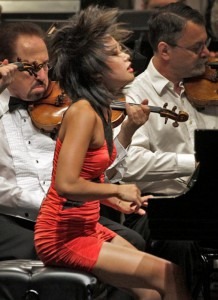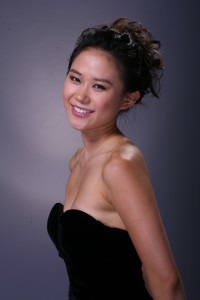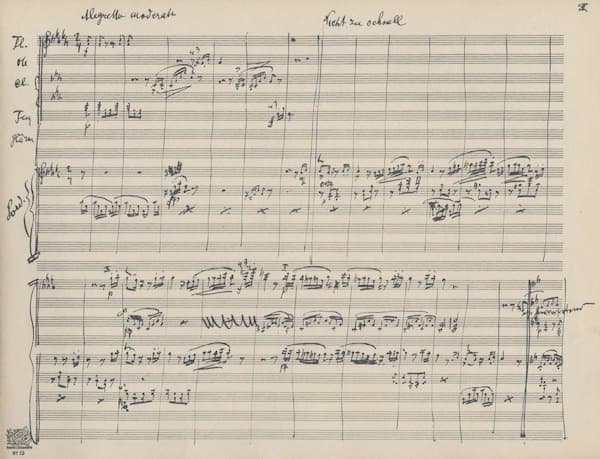 Dear Yuja,
Dear Yuja,
I am writing this open letter to you, as I want the world to know that I am in awe of your piano playing. Since I followed your musical career from the age of seven, I have not ceased to be amazed by your super-human technique, the swiftness of your fingers, and the incredible rate of accuracy when you play at breathless speed. I am sure you have been asked this question often : How do you do it?
In my long teaching career, I have encountered students with nimble fingers but without strength, and those with strength but without flexibility. You seem to possess both power and agility in your fingers. Pray tell : How do you do it?
It is apparent that you are an extremely skilled pianist, a recipient of expert teaching and a student blessed with intense focus and discipline. Everything sounds easy when you do it – all the notes, tempi, nuances, colour, phrasing, rubato, even interpretation. They all ooze out of your pores effortlessly and naturally. Again : How do you do it?
My conclusion is : it is your destiny to be a highly accomplished concert performer. Your fast fingers can challenge anyone, even Martha Argerich. Your overwhelming power can rival any pianist twice your size. You can tackle any interviewer, even the mean ones. Your charismatic smile ( or laugh ), your self-assuredness and especially your sense of humour can charm audiences of any age and nationality. In other words, you are an enormous talent in every sense of the word.
As your grow and develop into a world-class concert pianist, appearing in more concerts than most established musicians, I begin to notice a transformation on stage. Your shoulders became more and more bare, your dresses shorter and shorter, cut-offs in your dresses larger and larger, and your heels higher and higher. There were whispers among your fans and dissenters alike about your choices of attire. Many comments were downright insulting. I wonder whether it is a strategic decision to market to a specific demographic or generation, to promote a “hot and hip” rock star image, or simply a way of attracting attention at all cost. Truthfully, it bothers me, as well as others, as the visual distractions detract from your exquisite piano playing. It becomes a spectacle, where your audience comes to “ogle” you rather than appreciate your fine music. I have to ask these questions : Why do you do it? Isn’t your music good enough an attraction?
 Your scope of repertoire is very impressive, comprising of various massive concertos by Rachmaninoff, Tchaikovsky, Prokofiev – to name a few, and other fabulous romantic works by Chopin, Liszt and Schumann etc., which you always appear to whip up at a moment’s notice ( or so it seems ). With each piece, your interpretation is so well rehearsed that emotions seem to spill out of your fingers without filtering through your mind or your heart. In other words, even when I am totally captivated by your performance, I often have difficulties capturing the emotional essence of the music. Do you still feel passion for the music you perform?
Your scope of repertoire is very impressive, comprising of various massive concertos by Rachmaninoff, Tchaikovsky, Prokofiev – to name a few, and other fabulous romantic works by Chopin, Liszt and Schumann etc., which you always appear to whip up at a moment’s notice ( or so it seems ). With each piece, your interpretation is so well rehearsed that emotions seem to spill out of your fingers without filtering through your mind or your heart. In other words, even when I am totally captivated by your performance, I often have difficulties capturing the emotional essence of the music. Do you still feel passion for the music you perform?
I have to acknowledge the fact that you are indeed a virtuoso. Horowitz once said : To be more than a virtuoso, one has to be a virtuoso first. You are definitely on the right track. I was especially touched by one of your interviews, when you admitted that you require maturity to handle Beethoven’s works, and that one of these days, only if the time is ripe, you will be ready to play them. Such self awareness is truly admirable, particularly in one so young and so successful.
To profoundly move an audience, one needs to explore and embrace one’s vulnerabilities. If our vulnerabilities have been denied, hidden or imbedded for too long, they will become elusive to us. The notion that to be a successful performer, one has to constantly be confident, controlled and “in your face”, robs us of these most precious sentiments. Once we search within our hearts to unveil our own vulnerabilities, we can miraculously transform them into a high art form. I look forward to the day when you can celebrate your sensitivities through music.
Last but not least, I am sending you a short video by Maria Joao Pires, one of my most revered pianists. In it she shared some philosophical moments ( through excerpts from the Chopin Cello Sonata op. 65 ) with Jian Wang, my favourite cellist, in her journey past “success” to reach “home”, i.e., her heart’s destination.
I wish you luck on all your future endeavours.
Sincerely,
Ellen Wong Tso
More Blogs
-
 Classical Music Unfinished and Restored II From Mahler's heartbreak to Weber's lost opera
Classical Music Unfinished and Restored II From Mahler's heartbreak to Weber's lost opera - Thus Spoke Friedrich Nietzsche
Piano Music Explore Nietzsche's hidden musical legacy! -
 The Label that Shaped Classical Music Why Deutsche Grammophon remains the dream destination for musicians
The Label that Shaped Classical Music Why Deutsche Grammophon remains the dream destination for musicians -
 Five Women in Tchaikovsky’s Life From his beloved mother Aleksandra to his patron Nadezhda von Meck
Five Women in Tchaikovsky’s Life From his beloved mother Aleksandra to his patron Nadezhda von Meck




Why does she wear those dresses? Because she can wear whatever the hell she wants. If people want to go just to see her and not to listen to hear is their fault, not her fault. Her music does not become affected by what she wears, and if it bothers you the way she dresses well then close your eyes, instead of asking her to change her outfit.
Exactly!
I think you need to watch this in order to understand her point of view about this topic 😉
https://www.youtube.com/watch?v=FEulYHnPfaQ
“Vulnerability is the source of hope, empathy, accountability, and authenticity.” — Brené Brown. We know that music is not all joy and exuberance, but also pathos and poignancy. When the pianist has reached the very top at a young and tender age, to be adulated by millions, how can she pause and reflect on life and gain some depth and empathy in her music? I hope time will help, and cutting down the number of concert commitment!